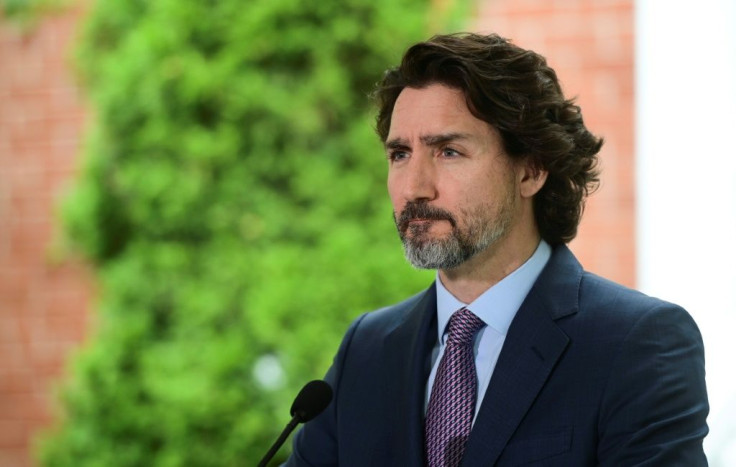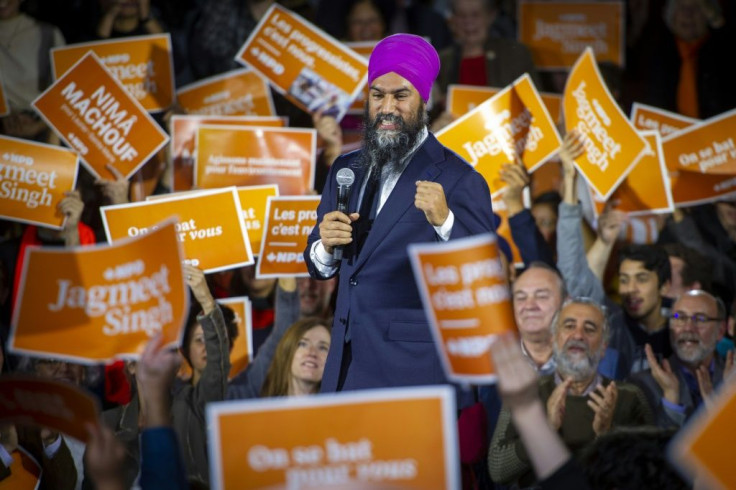Canada's Trudeau Calls Snap Elections
Canadian Prime Minister Justin Trudeau on Sunday announced snap elections for September 20 to seek a new mandate to steer the nation's pandemic exit, much to the dismay of his rival parties.
Despite rolling out massive pandemic aid, passing a federal budget and other key legislation with opposition backing over the past year, Trudeau -- in office since 2015 -- has lamented that parliament has become dysfunctional.
The prime minister met Governor General Mary Simon on Sunday to ask her to dissolve parliament, triggering a general election that polling shows is likely to return his Liberals to power.
"Canadians need to choose how we finish the fight against Covid-19 and build back better -- from getting the job done on vaccines, to having people's backs all the way through to the end of this crisis," Trudeau said after the meeting.
All five parties currently holding seats in parliament are gearing up for a fierce battle at the ballot box.

Most Canadians approve of Trudeau's pandemic response. But if a fourth wave of Covid-19 infections strikes during the campaign, it could hurt his backing.
"This was the only window of opportunity for him because with students' return to school and universities in two weeks, Covid cases will inevitably go up," Felix Mathieu, political science professor at the University of Winnipeg, told AFP.
Trudeau's government "has already held for 18 months, which is the average lifespan for a minority government," he added.
Despite rising vaccination rates that are among the highest in the world -- with almost 62 percent of Canadians fully inoculated -- nearly 1,000 new daily Covid-19 cases have been reported across Canada recently.

Trudeau was re-elected to office in 2019 but lost his majority in his second term, amid scandals.
To regain a majority on September 20, the Liberals must win at least 170 of the 338 seats in the House of Commons, up 15 seats from their current standing.
According to a recent Abacus Data poll, the Liberals are in striking distance of a majority, with 37 percent of support.
The Conservatives and the leftist New Democrat Party -- which propped up the Liberals until now and has seen an uptick in support -- trail on 28 percent and 20 percent, respectively.
Trudeau's main challenger, Conservative leader Erin O'Toole, meanwhile, has struggled to find his footing since becoming leader of the Conservatives in August 2020, as lockdowns and other public health measures put glad-handing out of reach.
In March, he found himself painfully at odds with his rank-and-file after telling a party convention that a robust plan to tackle climate change was needed if the Conservatives ever hoped to unseat Trudeau. Members instead voted down a resolution that said "climate change is real."
On Sunday, he focused his first campaign speech on the promise of a "strong economy."
And he denounced Trudeau's decision to call an election, saying the country should not put its fight against Covid-19 at risk "for political games, for political gain."
Jagmeet Singh, who heads the New Democratic Party (NDP), is Trudeau's other rival and could win votes for the Liberals among young and urban voters.
Denouncing Trudeau's "selfish summer election," he said on Sunday he was ready to "fight for working people, to make the ultra-rich and big corporations pay their fair share, and to build a recovery that works for everyone."
Campaigning is to last only 36 days and is largely expected to revolve around pandemic management, the government's broad emergency aid programs, and a three-year CAN$101.4 billion (US$80.9 billion) post-pandemic stimulus plan.
© Copyright AFP 2024. All rights reserved.





















